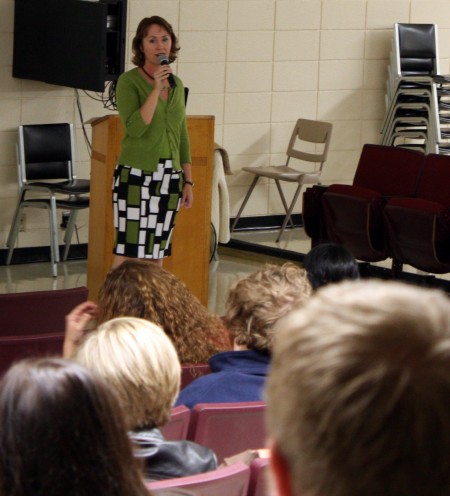
Lesbian author Bernadette Barton recently spoke at Murray State about the effect of being gay in the Bible Belt. She asserts repressing homosexuality – because of religion – has a directly negative impact on a person’s life.
Barton presented “The Toxic Closet: Christianity and Homosexuality in the Bible Belt”, her multimedia lecture, on Nov. 1 in the Mason Hall auditorium.
Her presentation, a summation of her novel, “Pray the Gay Away: The Extraordinary Lives of Bible Belt Gays”, was sponsored by Alliance, the Campus Activities Board, the Gender and Diversity Studies Program, LGBT Programming, Ministry Open to All and Student Affairs.
Over 100 people attended the event including Student Government Association President Jeremiah Johnson and vice president of Student Affairs Don Robertson.
Barton, a professor of Sociology and Women’s Studies at Morehead, spoke on a variety of issues relevant to the Bible Belt gay community. Most prominent of these issues was that of institutionalized homophobia: homophobia indoctrinated into the teachings of many Christian churches in the Bible Belt, and the concept from which she attributed the majority of the Bible Belt’s animosity towards gays to come from.
“The Bible Belt is a region that fosters what I call ‘compulsory Christianity’,” Barton said. “You see signs in the physical landscape that are Christian symbols, people ask you where do you go to church, and you’re expected to pray at gatherings. You see representations of Christianity all around you.”
“If you’re a gay person experiencing same-sex feelings at a young age and you belong to a family and church where you hear that you’re going to go to hell if you don’t do ‘x,y and z’, that is going to have a strong impact on you.”
The region of the United States informally referred to as the “Bible Belt” is comprised of the south-eastern and south-central states, the population she said, which consists of a large number of socially conservative, fundamentalist Christians. The Bible Belt includes Kentucky, almost the entirety of the south, Texas, and extends as far north as Missouri.
Her book includes 59 interviews with gay men and women predominantly from Kentucky and Texas. Barton shared in her lecture, a number of these interviews, excerpts from her book that she had conducted with homosexuals who shared their experience of growing up gay in the Bible Belt.
She included multiple video clips in her slideshow of prevalent anti-gay leaders and organizations in America including Fred Phelps, the head of Westboro Baptist Church, Alan Chambers, president of Exodus International–an organization which until recently endorsed different forms of gay-conversion therapy–Rick Scarborough, head of Vision America–a group attempting to “restore Judeo-Christian values to the moral and civic framework in their communities, state and our nation” and the American Family Association, a non-profit organization which like Vision America, promotes conservative fundamentalist Christian values.
“These kinds of homophobic messages from organizations like the American Family Association create prejudice, confusion and fear in people and they also socialize gay views that there is something wrong with them and they must change,” Barton said
Barton spoke at Murray State three years ago on a then recent paper revolving around what she calls the “toxic closet”; she has since expanded this initial paper and research into her new book and the work she presented most recently at Murray State.
The “toxic closet” is the notion that not coming out as a homosexual is a detrimental practice that will cause internal strain, and derives from the thought that it is their burden and duty to stay in the closet for the good of themself or those close to them.
Other consequences Barton listed of not coming out included low self-esteem, the development of the idea that the person is a second-class citizen, the development of a dual personality and the distancing of one from their family.
“In order to avoid rejection from family and friends many gay people stay in the ‘toxic closet’,” Barton said. “Among the most troubling aspects of the ‘toxic closet’, and there’s a whole lot that is troubling about it, is that it forces the minority member, the gay person, to participate in their own oppression while protecting the comfort levels of their oppressors.”
“The obvious solution to all the issues I’ve been raising here is that inclusion benefits everyone,” she said. “The more open and integrated a gay person is within social networks: family, schools, work places, churches, the more happy and productive is the individual and the more everyone benefits.”
Story by Ben Manhanke, Staff writer